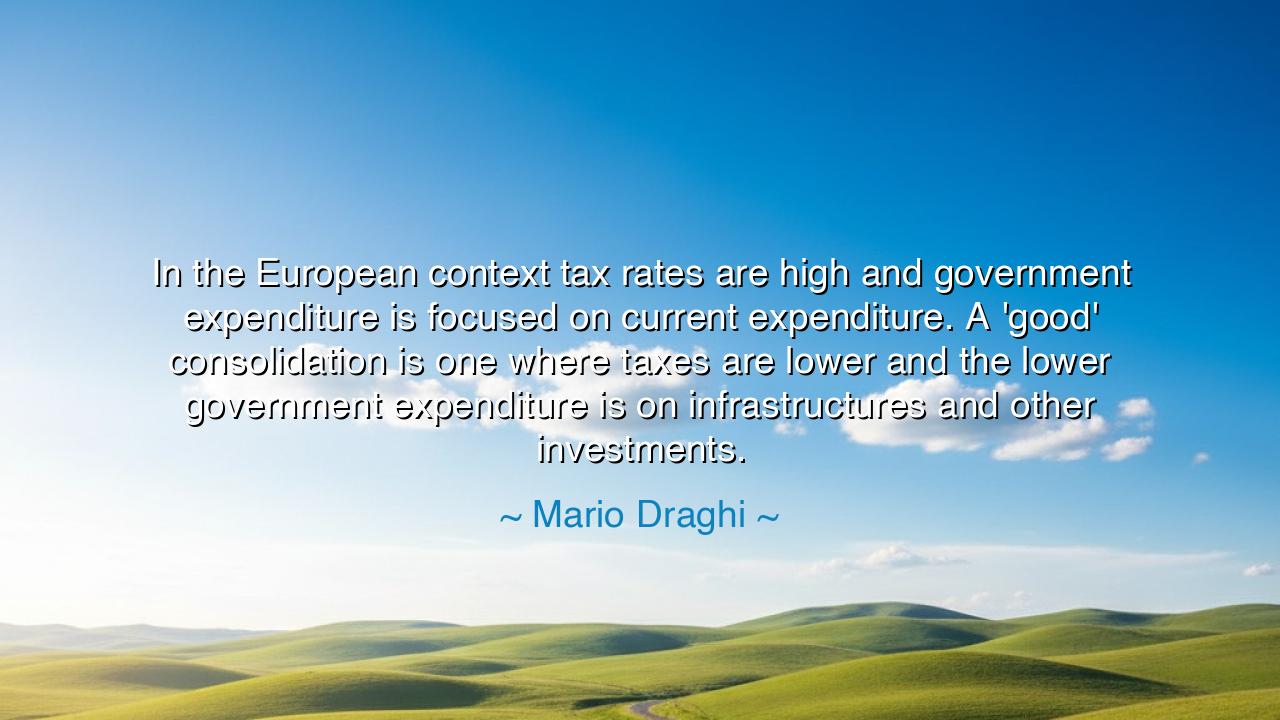
In the European context tax rates are high and government
In the European context tax rates are high and government expenditure is focused on current expenditure. A 'good' consolidation is one where taxes are lower and the lower government expenditure is on infrastructures and other investments.






Hearken, children of prudence and seekers of wisdom, and attend to the words of Mario Draghi, who proclaimed with measured insight: "In the European context tax rates are high and government expenditure is focused on current expenditure. A 'good' consolidation is one where taxes are lower and the lower government expenditure is on infrastructures and other investments." In this reflection lies a profound meditation on fiscal responsibility, economic growth, and the strategic stewardship of public resources. Draghi reminds us that governance requires not only collection of wealth but also its wise deployment for the enduring benefit of the nation.
The origin of Draghi’s insight rests in his stewardship of European financial systems, where the delicate balance between taxation, spending, and growth is paramount. Excessive taxation burdens the citizenry, while expenditures concentrated solely on current consumption do little to build the foundations for future prosperity. Draghi emphasizes that a “good” fiscal consolidation is not mere austerity, but a thoughtful realignment that reduces taxes and channels resources into investments that strengthen the economic and social infrastructure of the nation.
Consider the imagery of infrastructure and investment. Roads, bridges, schools, and technology are not mere expenditures—they are the arteries and vessels through which the lifeblood of society flows. A government that focuses on these forms of spending prepares the nation for long-term growth, enhancing productivity, trade, and opportunity. Draghi’s wisdom illuminates the principle that true consolidation strengthens both freedom and capability, rather than simply shrinking government at the expense of the future.
History provides vivid exemplars. In post-war Europe, the Marshall Plan combined fiscal prudence with strategic investment, rebuilding shattered economies while fostering long-term growth. Countries that invested in infrastructure, education, and industry experienced lasting prosperity, while those that relied solely on short-term consumption struggled under the weight of inefficiency and stagnation. Draghi’s reflection is a modern echo of this enduring lesson: expenditure must be purposeful, strategic, and forward-looking.
Draghi’s statement also illuminates the moral dimension of governance. A government that balances taxation with investment respects both the present and future generations, ensuring that citizens are neither overburdened nor deprived of opportunity. Fiscal prudence is thus intertwined with justice, as it ensures that resources are allocated to initiatives that sustain livelihoods, commerce, and the collective well-being over time.
The lesson is eternal: economic stewardship demands foresight, balance, and strategic action. A society flourishes when government resources are deployed not merely for immediate consumption, but for investment in its enduring strength. Taxes should be reasonable, expenditures purposeful, and consolidation should serve the long-term vitality of the nation rather than short-term political convenience.
Practical actions emerge naturally: advocate for fiscal policies that balance taxation and investment; support public projects that enhance infrastructure, education, and innovation; engage in civic discourse about government spending priorities; and educate oneself about economic policy and its long-term effects. By doing so, citizens contribute to a governance framework that ensures both prosperity and resilience.
In sum, Draghi’s words illuminate a profound truth: true fiscal consolidation strengthens a nation through lower taxes and strategic investment, building a foundation for lasting growth and opportunity. Let this wisdom guide leaders and citizens alike, ensuring that wealth is used not only to sustain the present, but to empower the future, forging societies that are prosperous, resilient, and just.
If you wish, I can craft an even more epic, mythic version, turning Draghi’s reflection into a heroic narrative of stewardship, foresight, and the long arc of economic prosperity—perfect for immersive audio storytelling. Do you want me to do that?






AAdministratorAdministrator
Welcome, honored guests. Please leave a comment, we will respond soon